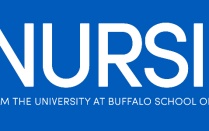Baby-Friendly is Mom-Friendly, and Nurse-Friendly

Published September 1, 2018 This content is archived.
When traditional nursing student Maryamihan Caluma first stepped into Clinical Assistant Professor Jennifer Guay’s Nursing Care of Women and Children course, she didn’t know just how interesting maternal-newborn topics might be, or the lasting impression it would leave on her as a future nurse.
Within two weeks, that changed – Guay’s passion for the subject was magnetic, and Caluma was pulled in.
Intrigued by Guay’s enthusiasm, Caluma approached the professor about completing an honors project with her. Guay presented an opportunity to gain hands-on experience at Millard Fillmore Suburban Hospital, and to affect real change to policy and procedure – Caluma would meet with the nurse educators there and assist them with their Baby-Friendly Hospital Initiative.
“The nurse educators at Millard Fillmore were very happy to have me help with the Baby-Friendly Initiative,” says Caluma. “And, it was a great experience in conjunction with the course.”
A global program launched by the World Health Organization in the early 1990s, the Baby-Friendly Hospital Initiative aims to improve maternity services and the care of pregnant women and newborns. The initiative promotes breastfeeding as beneficial to both mother and baby, and stresses bond-establishing practices like rooming in and skin-to-skin contact.
“Millard Fillmore Suburban Hospital is leading the Baby-Friendly Initiative in Western New York,” says Guay. “The initiative enables Moms to bond with their newborns from the moment of birth through the hospital discharge. They get to know their newborns, enabling them to respond to early feeding and behavior cues. Moms are empowered as they care for their new addition to the family and more confident when it is time for discharge.”
When Caluma began to work with the nurse educators at Millard Fillmore, they were in the dissemination phase of the process. After the nurses on the mother-baby unit were educated in baby-friendly practices, it was Caluma’s job to survey nurses and mothers to determine if these practices were being properly implemented and how they affected the post-delivery experiences of the mothers.
“It was a pleasant surprise to see how receptive the mothers were to the survey,” Caluma says. “They were so willing to tell me about their babies and their experiences. Conducting the surveys with the mothers also allowed me to observe the family dynamic and potential issues, which was really interesting.”
While she worked with the mothers with ease, Caluma observed that the nurses were at different levels of implementation of baby friendly practices. While changing practices can be difficult at times – maybe even uncomfortable – for some nurses, Caluma says she now realizes the importance of lifelong learning in the nursing field.
“At UB we learn the importance evidence-based practice,” says Caluma. “[The professors] reiterate that learning doesn’t stop when you become an RN – you have to keep training and reading the research to stay current, even after you earn your license. This is important because practice is always evolving.”
Though Caluma does not plan to pursue maternal-newborn nursing after graduation, she learned some very valuable lessons during the project. She understands the value of evidence-based practice and critical thinking, and the value of nursing research. She recognizes that the willingness to adapt, to subscribe to a philosophy of lifelong learning, will ultimately help nurses provide better care for their patients.
Caluma aims to transition into critical care post-graduation, and says this experience provided her with a foundation to thrive.
“Comprehending the value of evidence-based practice and being open to new knowledge is fundamental,” says Caluma, “and this will help me to better understand protocol and evaluate resources. This is vital to ensure I am doing what’s best for critically ill patients.”
-SARAH GOLDTHRITE
Read More UBNursing
Current Issue
Past Issues
We want to hear from our incredible alumni. Whether you live in Western New York or anywhere else in the world, stay in touch! Send us a class note.

